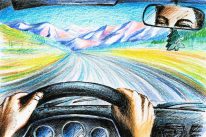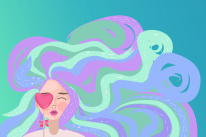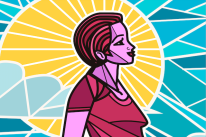
“But first be a person who needs people. People who need people are the luckiest people in the world.” ~Bob Merrill, lyricist, Barbra Streisand, artist
Act 1: Babs and Me
Barbra Streisand and I could be twins.
For starters, we were born on the same day.
Sure, she got here a couple of decades earlier, but except the part where she’s a rich, famous, writer-director-actress married to James Brolin, and oh, that singing thing, we could have been separated at birth.
We both have blue eyes and chemically enhanced blonde hair. We speak the same language; in Brooklyn or Philly, you say, tuh-may-duh, I say tuh-may-duh.
Our cultural heritages are similarly steeped in neuroses and commandments, thus our identical self-confidence issues. A small sampling of the insecurities we share:
- We are overly concerned with our appearances (but complain about getting dressed and combing our hair.)
- We have stage fright and always will.
- We suffer from PTCSD (post-traumatic-childhood self-worth disorder).
- We only remember our bad reviews.
- We photograph better from the left, we believe.
- We want people to like us, mostly so they don’t hate us.
- We prefer dark rooms filled with people we don’t know to small rooms of people we are supposed to.
- We worry about money, me a little more than she.
- We are people who need people.
“People” was Babs’s first Top 10 hit. When my mom sang along with the “Funny Girl” in the sixties, I thought “People” was a love song. You too?
Lyricist Bob Merrill’s original hook was “one very special person,” because “Funny Girl” is the story of how singer Fanny Brice found the half that made her whole in gambler Nick Arnestein.
Lucky her.
Except, there are two kinds of luck, as Nick learns, and Fanny ends up hungry and thirsty again.
So Merrill put the kibosh on only lovers being very special in favor of, first, an emotional connection with people. Plural. The new focus reflected a key plotline in the movie: the need for people to be vulnerable enough to ask for help and have more than one person to ask.
Barbra gave us a glimpse of Fanny’s vulnerability when she sang “People.”
The audience connected to Fanny when she performed because they saw a real person with self-doubt and sorrows, despite her success. Fanny needed the audience to give her the confidence to come back after she lost everything.
At the time, Barbra told reporters she too connected with the audience by being authentic. Thus, putting on a show made her vulnerable, to her emotions and to criticism, the worst of which came from herself. Her constant internal refrain was:
“What if they don’t like me?”
That’s it, isn’t it? The real feeling deep in our souls? What if they don’t like you?
And we aren’t acting more like children than children.
We crave inclusion so much that admitting we want a connection with another person—not even a lover, a fellow human—is as frightening as a death threat. Grown-up pride can’t hide the need to belong.
So we hid, Babs and me. From the world, for years, for the same reasons, on fraternal twin timelines.
I went underground a little later than Barbra. At thirty-three, I walked away from public office after seven successful years because I couldn’t live in the spotlight. Despite building playgrounds and guarding the treasury to the acclaim of voters and editorial cartoonists, I drew the curtains on 10,000 constituents.
Fast-forward to forty and still single, my remaining confidence was shredded like a New York Times review. “One of these things is not like the others, one of these things does not belong” was my hit song. The words are forever imprinted in my brain.
Stage fright seized Barbra’s confidence at twenty-five, when she forgot the words to a song, in front of 135,000 “voters,” under a literal death threat. Spotlight size is relative, though, so it was essentially the same situation as mine, and so Babs walked away from public performance too.
What’s more, by her early forties, the great and powerful Ms. Streisand shared my Sadie envy. We had similar spinsterly reactions: we blamed ourselves and then spent years and thousands trying to fix ourselves.
Working from home aided and abetted my self-imposed isolation for seven years. Barbra tightly controlled, well, everything, for twenty-seven years.
Lucky her.
While hiding from paying customers, Barbra used her talent to make the world a better place in performances for protecting the environment and civil rights. I try to make the world a better place by protecting animals and writing about single life. I hope I’m talented.
We were happy during that time, B & me. Fear was barely an impediment. Life was a Greta Garbo bio-pic. We were content cocooning. Searching deep in our souls, we discovered we were already whole.
Then we remembered we need people.
Act 2: Babs and Me, Reprise.
And people needed us.
Were we ready for our comebacks? Seems so.
Barbra hit the trail partly because her calendar was open: two films were serendipitously postponed. She also wanted to secure her financial future. Lucky her, she required only two performances to be set for life.
A secure financial future is on my trail too, though right now I need two jobs to be set for the year. That said, I’m just about the age when Babs went public again. Give me another twenty years to achieve international fame and fortune.
Time and money are powerful incentives, but as Barbra declared, “Opening your heart is the goal of the quest.” Ultimately, what brought us both back was the need for connection, with people.
Despite stage fright and a black hole of confidence, we needed to belong, where we belong.
So what did we do?
Like twins, we did the same thing. Babs went back on tour. I went back East.
While I moved home to Philadelphia, Barbra brought her home to the stage. The set for her first comeback concert looked like a living room, albeit Louis XIV’s living room.
On her seven-month tour, Barbra had family on hand. On my return, I stayed with my sister for seven months. Needing people and living with them entail completely different kinds of vulnerability. And restraint.
Barbra managed any word-related worries with Teleprompters. I prompted myself to exchange kind words with neighbors and to meet new friends—no worries.
Babs had something to do with her hands, and visual aids. Me too—a puppy.
She told stories, which is my real talent. Amusing anecdotes are mood-stabilizers for me.
Speaking of drugs, we are both honest about it. Barbra and I benefitted from advances in psychopharmacology. A beta blocker here, an SSRI there, and we can face our mutual under-abundance of confidence.
Medicine aside, maturity helped. By fifty, we understood that some losses are forever; some things cannot be changed. We realized we are each, first, a person who needs people, and that’s okay.
Gambling with our vulnerability continues to pay confidence dividends.
Barbra is able to do public shows whenever she wishes. She re-connects with her audience; she belongs on stage. Going solo in a duo society gives me the confidence to connect with people and to show up, for myself and my friends. This is where I belong.
Barbra still retreats, hiding in Malibu, with James Brolin. I still hide at home, in Philadelphia, with yet another puppy.
What’s really funny, girls and boys, is how many of us think hiding behind the curtain or in our bedrooms is riskier than opening night or opening a door. We might feel safe but we won’t ever feel secure without emotional connections. Poets, playwrights, and psychiatrists agree: people really do need people to survive.
Maybe you have stage fright, and all the world is a stage. Maybe you are shy, or ‘new around here.’ Maybe you made a bad bet at work or love and lost your confidence.
Take it from Fanny, Babs, and me, be vulnerable. Maybe for the first time, let yourself be a person who needs people and your luck will change.
Are you ready for your Act 2?
Man behind curtain image via Shutterstock
About Beth O'Donnell
Beth O'Donnell is a self-employed telecommunications consultant, though she claims expertise in solo adventures, broken hearts, and Boxer dogs. She blogs at Single and the Sweet Side of 40 where she often quotes Mae West: “I am single because I was born that way.” Beth resides in her native Philadelphia, a happy sister, aunt, friend, daughter and unhappy sports fan.













 Though I run this site, it is not mine. It's ours. It's not about me. It's about us. Your stories and your wisdom are just as meaningful as mine.
Though I run this site, it is not mine. It's ours. It's not about me. It's about us. Your stories and your wisdom are just as meaningful as mine.
This really struck a chord with me. I struggle to function in the everyday world and have cut myself off from nearly everyone. I want to be liked but find it hard to bring down these walls I’ve built. Great story x
It took me a years (and a lot of Oprah lol) to admit that I was hiding and it was hurting me more than if I forced myself out of my comfort zone (and out of my house). The number one thing I did was to start to interact with people again was to say hello to my neighbors, all of them, and smile a lot.
The number one lesson I have learned is that nearly everyone is nervous about meeting new people, and most of us are waiting for someone to break the ice.
All that said, it is still not easy and I doubt it ever will be. Feeling like we belong is the primal human urge and feeling like we don’t is the primal human fear.
I talk a lot about connecting (NOT dating) with people on singleandthesweetsideof40.com. I hope you’ll poke around the site and find some more things that ring true to you.
Thanks for your nice words. You will be on my mind.
Thanks Beth (Barbs) for that post. I too have the same issue and for years stayed by myself and truly enjoyed my own company even though I miss being around people. I was so rigid because I believe all my friends and people in my life should have the same values like I do and if you didn’t believe in the things I did you couldn’t be my friend so it was easier to remain friendless for many years.
As I grew older I realize that no one is perfect including good old me and that people would be giving up some of themselves to be my friend as well. That has made life much easier but also scarier at the same time. I think it is harder to make friends when you are older as well.
It is sooooo much harder to make friends as you get older. My best tip for that is to take walks around your neighborhood and say hi, and to become a regular at a local restaurant or bar. There is something to that whole “Cheers” thing. One thing I know for sure is that anyone who is alone in a restaurant or bar is waiting for someone else to talk to them. Might as well be me (or you). Try it. Both of you will have a better time. Stay in touch Rose.
Thanks for the story and the advice! I will work on that!
You are the best Gina.
Hi Beth. That’s a list of my own insecurities. How did you know!! Thanks for the encouragement you have given me to take a leap of faith into Act 2. We definitely need people, I agree. It’s time for me to get out there and connect, benefit from others’ expertise and pass on some of my own. Thanks for the reminder that to survive, people need people.
Too funny- same insecurities. I guess I am not as odd as I think. The smallest move you can make toward connecting with other people is a huge leap. Keep me posted on your Act 2.
I have one close connecting
relationship in my life right now. Interestingly, it is an email relationship
with a former teacher. This teacher is himself single, and although I have
shared many feelings with him, he does not share feelings back, but he has been
totally kind, and does not take advantage of my vulnerability. In turn, I do
not make demands on him or on the relationship.
Your
article on Barbara Streisand makes me wonder if he is one of those people who
finds sharing with individuals impossible, but shares with groups of students
who he is. I find that very satisfying also. I know I can form a relationship
with most groups of students that will affirm them and myself. Why is this so
much less risky than a personal relationship with another person?
I
wonder if my mentor experiences feelings of self-imposed exile? I know that I
do. And I do look to my students– which is my stage—for connection.
I
wonder what would happen if I asked my friend if he ever had moods like the
ones I confess to. Does he have other people he talks personally too? or not?
Do some people not need to share
emotionally. His response to me is always either encouragement, or simple
acceptance without comment. He never makes me feel bad, but I make absolutely
no demands on him either. He has indicated that in previous relationships with
students, he has had to eventually cut them off. That makes me want to find
other more equal relationships, rather than push any limits in this one.